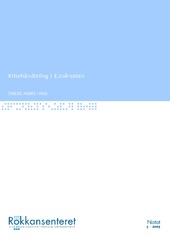| dc.contributor.author | Haug, Sindre Andre | eng |
| dc.date.accessioned | 2011-10-13T12:25:56Z | |
| dc.date.accessioned | 2020-12-10T06:32:29Z | |
| dc.date.available | 2011-10-13T12:25:56Z | |
| dc.date.available | 2020-12-10T06:32:29Z | |
| dc.date.issued | 2009-05 | eng |
| dc.identifier.issn | 1503-0946 | |
| dc.identifier.uri | https://hdl.handle.net/1956/5098 | |
| dc.description.abstract | This paper is based on an in-depth study of the Norwegian Food Safety Authority’s management of the E.coli crisis in the spring of 2006. The study examines crisis management from sense making through decision making to the end games and implementation of lessons after the crisis. The case of the E.coli crisis is analyzed from a structural-instrumental and a cultural-institutional perspective. The study shows that both perspectives are significant to understanding the crisis management. The reorganizing of the Norwegian Food Control Administration in 2004, included integration of several laws and considerations in a new and coordinated legislation, enforced by a new regulatory body, the Food Safety Authority. This study shows that the Norwegian Food Authority’s management of the crisis was influenced by the newness of the organization. There were several challenges of coordination. Horizontal challenges were expressed through tensions between the department of agriculture and the department of health with regards to which department should be given the responsibility to be in charge of the crisis management. Horizontal challenges of coordination were also expressed through tensions between the National Institute of Health and the Norwegian Food Safety Authority. Vertical coordination was challenged by weaknesses in the Food Safety Authority’s internal follow-ups on the investigation process. Organization of the crisis management varied from day to day on an ad hoc basis, and was influenced by the lack of an implemented model of crisis management. The end games of the crisis management were positively influenced by finding the cause of the outbreak. There were still many unanswered questions. As a response to these, The Food Safety Authority and the Norwegian government each launched independent investigations on their crisis management. Based on the reports from these investigations in addition to the Food Safety Authority’s internal research, several changes were implemented. This study indicates that the Food Safety Authority has progressed through the crisis, and has drawn lessons from the challenges. | en_US |
| dc.description.abstract | Dette notatet er basert på en studie av Mattilsynets håndtering av utbruddet av E.coli våren 2006 fra krisen ble erkjent, via krisebeslutninger til kriseavslutning og læring av krisen. E.coli saken analyseres med utgangspunkt i et strukturelt-instrumentelt og et kulturelt-institusjonelt perspektiv og det vises at begge perspektivene har forklaringskraft for å forstå krisehåndteringen. Matreformen i 2004 innebar integrering av flere lover og hensyn gjennom et nytt samlet regelverk, matloven, som skulle håndheves gjennom et nyopprettet Mattilsyn. Håndteringen av E.coli-saken bar preg av at Mattilsynet fortsatt var i en etableringsfase. Saken bød på samordningsutfordringer fra flere hold. Horisontale samordningsutfordringer kom til uttrykk i spørsmålet om hvilket departement som skulle være lederdepartement og i relasjonen mellom Folkehelseinstituttet og Mattilsynet. Vertikalt var det svakheter ved Mattilsynets interne oppfølging av oppklaringsarbeidet. Distriktskontorenes håndtering lokalt varierte. I tillegg bød håndteringen ved nasjonalt senter på samordningsutfordringer. Organisering av krisehåndtering bar preg av ad hoc tilnærminger og av at det ikke var implementert en modell for krisehåndtering. Etterspillet av håndteringen ble påvirket i positiv forstand av at smittekilden ble funnet. Likevel fremstod flere spørsmål som uløste. Mattilsynet og regjeringen iverksatte hver sin eksterne gransking. Basert på rapportene fra disse i tillegg til en intern gjennomgang av Mattilsynets organisasjon, ble flere endringer iverksatt. Studien konkluderer med at tilsynet kom sterkere ut av krisen og synes å ha dratt læring av utfordringene. | no |
| dc.language.iso | nob | eng |
| dc.publisher | Stein Rokkan Centre for Social Studies | eng |
| dc.relation.ispartofseries | Working Paper | en |
| dc.relation.ispartofseries | 5-2009 | en |
| dc.title | Krisehåndtering i E.coli-saken | nob |
| dc.type | Working paper | eng |
| dc.rights.holder | Copyright Stein Rokkan Centre for Social Studies. All rights reserved | |
| dc.subject.nsi | VDP::Samfunnsvitenskap: 200 | nob |
